Where to stream the 2021 Oscar movies, plus all our reviews of the nominated films in one convenient location

While we can’t wait to go to movie theaters again without worry, the pandemic lockdown has made the past 12 months an interesting time for cinephiles. Many critical darlings made their premieres to little fanfare on VOD; others launched on major streaming platforms as had been planned all along; and, sadly, more than a few that we were excited about have been pushed to later this year and beyond.
But since we’re all stuck at home as we wait for the world to fully open back up, that means there’s plenty of time to check out all the major Academy Awards contenders before the Oscars ceremony on 2021. Here, you’ll find where to stream the nominated feature-length films, as well as a bit of our thoughts on the nominess. If you want to read more about any given film, click the author’s name at the end of the passage to go to their full review.
Not every nominee among the big categories is currently available to stream, but we’ll continue to update this list as more films are released.

Movies about heavy drinkers tend to fall into one of two categories. Some of them are unabashed celebrations: drunken parties that seem to exist in a bubble of consequence-free inebriation, just like their (often collegiate) beer-chugging characters. On the far other end of the spectrum are the dramas of alcoholic despair, ruefully shaking their heads at the mess a drinking problem has made of some poor, perpetually blotto person’s life. Is there no middle ground on screen between letting the good times eternally roll and killing everyone’s buzz with the narrative equivalent of an intervention? Another Round, from Danish director Thomas Vinterberg, comes closer than usual to finding one. It’s about a group of middle-aged men who give their comfortable, predictable lives a fresh jolt by committing together to a kind of social experiment: They’ll stay mildly drunk all day every day, even during work hours. If that sounds like a recipe for disaster and addiction, you’re getting ahead of the movie, which does eventually stumble out of the elation of a perpetual buzz and crash back to earth. Yet even then, Another Round doesn’t quite come across like a cautionary tale, and that’s because Vinterberg takes a refreshingly, well, sober stance on the entwined pleasures and pitfalls of drinking. He’s made the rare movie about getting shitfaced that’s somehow neither a wallow in the gutter nor a fantasy of life without hangovers. Grade: B []Two nominations: Best International Feature; Director, Thomas VinterbergAvailable on and to rent on , , , , and

This Chinese drama was adapted from the popular YA crime-romance novel In His Youth, In Her Beauty by Jiu Yuexi. The film, which we did not review, centers on a bullied high school girl who falls for (in the words of the official description) “a street thug,” and how both of their lives were changed by each other. [Patrick Gomez]One nomination: Best International FeatureAvailable to rent on , , , , and
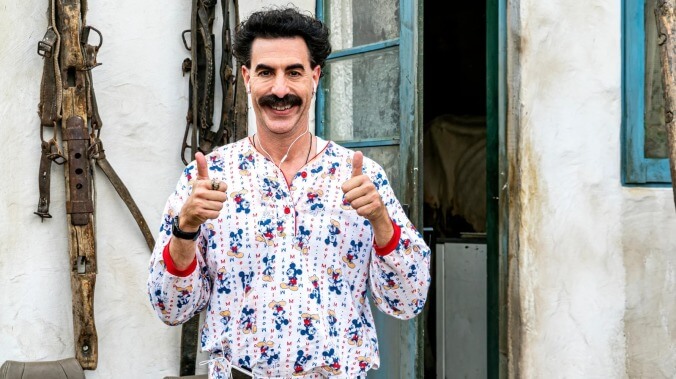
If Baron Cohen’s satirical aims could sometimes come across both broad and a bit slippery in 2006's , what hope does Borat have in 2020, wandering around the streets of the United States yet again? Borat Subsequent Moviefilm: Delivery Of Prodigious Bribe To American Regime For Make Benefit Once Glorious Nation Of Kazakhstan, shot in secret earlier this year, tries its best to make some accommodations for this shifted status quo while simultaneously reviving plenty of familiar bits. In its Kazakhstan-set prologue, Subsequent Moviefilm uses the popularity of its predecessor to explain what Borat has been up to all these years: He’s been sentenced to a life of hard labor after the success of his first film proved humiliating for his home country. He gets a shot at redemption with the election of Donald Trump: The installation of a strongman in the highest office of the United States provides an opportunity for Kazakhstan to assert its place on the world stage through, of course, a bizarre form of bribery. Grade: B- []Two nominations: Best Supporting Actress, Maria Bakalova; Adapted Screenplay
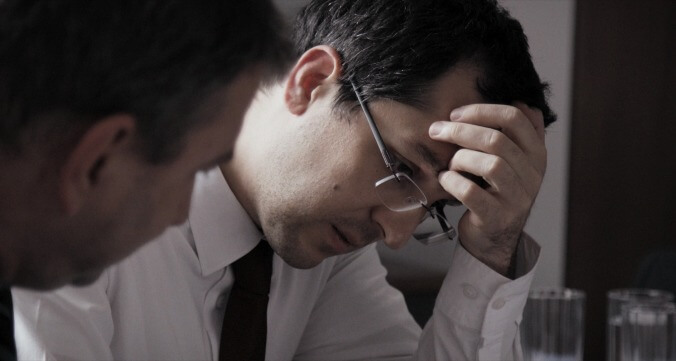
Early in the 21st century, a new wave of Romanian filmmakers like Cristian Mungiu, Cristi Puiu, and Corneliu Porumboiu began drawing international recognition for their gripping, docu-realistic dramas, addressing the power imbalances and the social dysfunction plaguing their country, post-Communism. The best way to describe Alexander Nanau’s documentary Collective is to say that it’s a non-fiction version of those new Romanian classics: like The Death Of Mr. Lazarescu or 4 Months, 3 Weeks And 2 Days, but with real people. It’s a taut, intense procedural, with a resonant story that simultaneously follows a journalistic investigation and an attempt to fix a fatally dysfunctional medical bureaucracy—all while criminal organizations, corrupt politicians, and rabble-rousing television hosts work in concert to stymie any real reform. The title of Collective refers to the Collectiv nightclub in Bucharest, where in 2015 a fire sparked by a metalcore band’s pyrotechnics show killed dozens. The tragedy shocked the conscience of the public, who demanded the government answer for its lax, backslap-and-handshake approach to regulating businesses. And then another crisis hit: Dozens more people who were injured in the Collectiv fire started dying in hospitals, from infections that took hold due to unsanitary conditions. An institutional purge ensued, and a new administration took over on a provisional basis. Nanau keeps the audience aware of the real stakes to all this journalistic digging and political gamesmanship. Throughout the film, he returns regularly to Tedy Ursuleanu, a Collectiv burn victim who has turned her experiences into art, forcing others to face what becomes of malfeasance and public indifference. Her work—like this searing and all-too-relevant documentary—is a reminder that elections have consequences. Grade: A- []Two nominations: Best Documentary; International FeatureAvailable to rent on , , , and
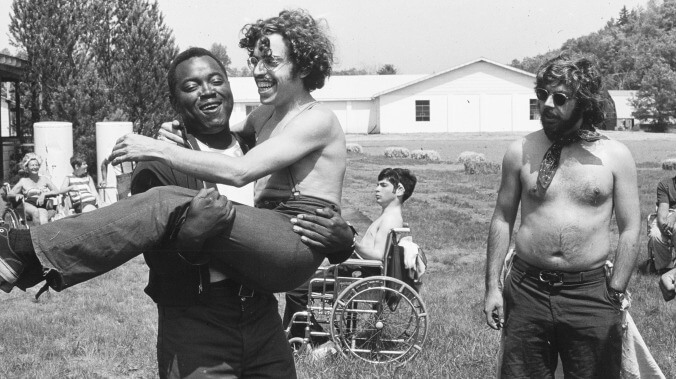
“The world wants us dead.” That statement is delivered, if not quite casually, then with startling clarity by one of the disability rights advocates interviewed in Crip Camp. Some might be shocked by the candor. But as this Netflix-released documentary makes clear, people with disabilities don’t have the luxury of being surprised by society’s indifference toward them. Able-bodied people may feel uncomfortable if a blind person doesn’t wear sunglasses or if they can’t understand the speech of someone with cerebral palsy. Now imagine being on the receiving end of that discomfort every day of your life, as disgust and pity are piled on top of constant reminders of how little the rest of the world thinks about you and your needs. A humanizing emphasis on providing those who live with these experiences the opportunity to recount them is where this otherwise conventional documentary shines. Grade: B []One nomination: Best Documentary
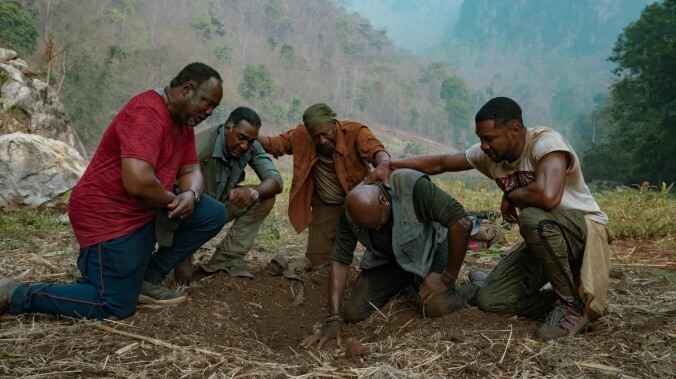
Spike Lee’s cultural messaging for once fails him in the politically muddled Da 5 Bloods. With the film, Lee offers his submission to a history of bloodied, masculine Vietnam War movies. Sadly, he’s more concerned with making a Vietnam movie that looks Black than one that actually takes on the complexities of Blackness, war, and global imperialism. The original screenplay, written by Danny Bilson and the late Paul De Meo, was intended to be a story about four white soldiers, and that seems to drive the film’s tonal disconnect. Lee partners with Kevin Willmott, his co-writer, to center Black male soldiers, but only in the most superficial way. Set mostly in the present day but with flashbacks to the ’60s, Da 5 Bloods follows Paul (Delroy Lindo), Otis (Clarke Peters), Eddie (Norm Lewis), and Melvin (Isiah Whitlock Jr.), four vets who return to Vietnam to retrieve the body of their fallen brother, Norman, and a bunch of gold they hid during the war. As soldiers, they formed a bond and began referring to themselves as Da Bloods. While the gold the men hid was intended as payment to a native tribe, Lee’s film decides they deserve it because they were victims of hypocrisy: They fought for freedoms abroad that they did not receive in America as Black men. Upon arrival, the men journey through the Vietnamese wilderness, where they’re forced to come to terms with what they actually do deserve—an approach that’s worked for some of the war films Lee references throughout Da 5 Bloods. Bilson and DeMeo provide the foundation for a fairly generic parable on war: The men face their demons and come to terms with the past. They question each other but ultimately build a deeper friendship. Grade: C- []One nomination: Best Score
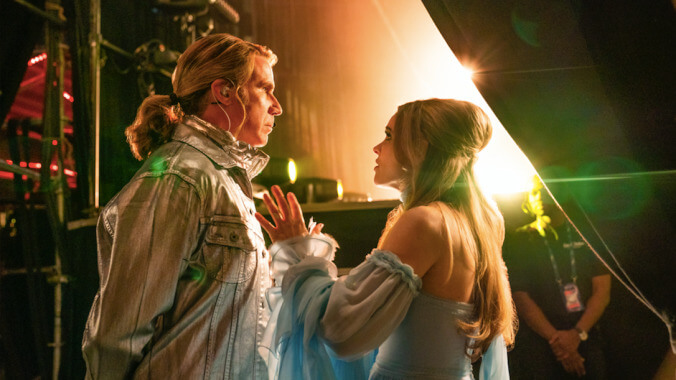
In a lot of ways, Eurovision Song Contest: The Story Of Fire Saga resembles Will Ferrell retreating into a greatest-hits mode, in sync with a movie about cheesy pop music. As in Step Brothers, he plays a young-at-heart, older-in-body goofball who lives with a single parent and harbors dreams of becoming a singer. He sports long hair and a ridiculous costume, just like he does in , and the narrative is driven by a contest—a singing competition, now that he’s run out of athletic ones. Eurovision even boasts an unwieldy subtitle in the style of The Ballad Of Ricky Bobby or The Legend Of Ron Burgundy. But like a scrappy underdog with no rational shot at winning an international singing contest, this Netflix production proves surprisingly lively. It follows the passion of Lars Erickssong (Ferrell), who was jolted out of childhood grief by witnessing the triumph of ABBA’s “Waterloo” at the Eurovision music contest of 1974. Since then, he has single-mindedly pursued his goal of winning that same contest, much to the disappointment of his taciturn father (Pierce Brosnan). This determination has resulted in a long-standing side hustle co-fronting a band called Saga Of Fire with his childhood friend, Sigrit (Rachel McAdams), who of course has an undying affection for Lars. []One nomination: Best Song
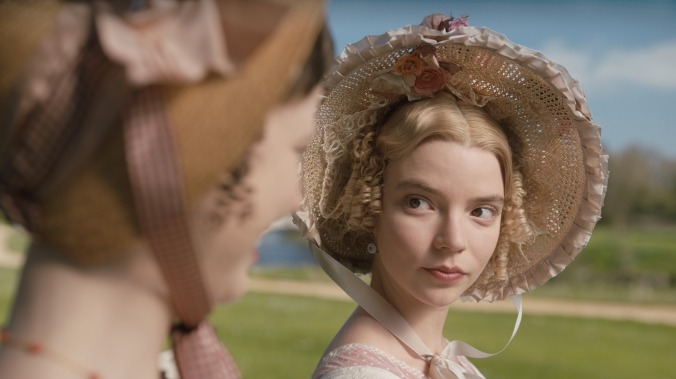
For the final novel published during her lifetime, Jane Austen set out “a heroine whom no one but myself will much like.” Unlike the noble underdogs of and , Emma Woodhouse is a wealthy, entitled young woman whose problems are largely of her own making. “The real evils, indeed, of Emma’s situation,” Austen explains, “were the power of having rather too much her own way, and a disposition to think a little too well of herself.” In her curiously punctuated adaptation, prolific music video helmer Autumn de Wilde pushes her protagonist’s haughty unlikeability even further. De Wilde’s stylish, stylized Emma. doesn’t rewrite the Austen playbook, but it shakes it up a bit—emphasizing the stakes of Emma’s careless meddling and adding a spiky 21st-century sensibility to Austen’s 19th-century ode to checking your privilege. De Wilde’s boldest choice is using the tone to reflect Emma’s arc from intelligent but dispassionate meddler to a young woman bowled over by her flaws and her capacity for love. Grade: B []Two nominations: Costume Design; Makeup and HairstylingAvailable on and to rent on and
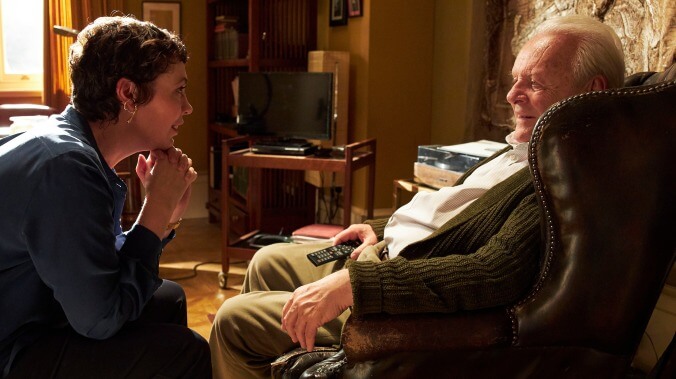
The Father does something rather disquieting with Anthony Hopkins’ star power and our assumed familiarity with it. To play a man who’s begun to lose his mental faculties, Hopkins methodically strips away every quality we’ve come to expect from him—the refinement, the silver tongue, the imposing intensity he lent and and —until there’s nothing left but frailty and distress. In doing so, he helps convey the full tragedy and horror of dementia: the way it can make someone almost unrecognizable to themselves and their loved ones. That the character is actually named Anthony only enhances the sense that we’re watching someone we know go through this nightmare ordeal. He’s introduced planted in a chair in his tastefully decorated London flat, reading a book while listening to classical music. For a moment, he could be any of the cultured, erudite men Hopkins has played over the years. But Anthony is soon interrupted by his grown daughter, Anne (Olivia Colman), who’s been checking on him regularly of late. And though he dismisses her concerns as quickly as he chased off the part-time caregiver she hired for him, it’s quickly clear that Anthony’s memory is getting foggier: He’s losing things around the flat (like his cherished wristwatch, which he insists the nurse stole even though he can’t remember where he hid it) and forgetting names and conversations. And that’s really only the start of it. Grade: B+ []Six nominations: Best Picture; Actor, Anthony Hopkins; Supporting Actress, Olivia Coleman; Adapted Screenplay; Production Design; EditingWill be available to rent via all major VOD platforms beginning March 26.

It’s World War II. Captain Ernest Krause, the kind of humble hero who says grace before drinking coffee, has been put in command of the long-range destroyer USS Greyhound as it escorts a convoy of Allied supply ships across the Atlantic. German U-boats are hunting in the cold, choppy waters, appearing as sinister pips on the radar or creepy screw noises on the hydrophone. On the bridge of the USS Greyhound, this occasions clangs, whistles, and a naval staccato of “starboards,” “bearings,” “full rudders,” and “aye aye, sirs,” to which Krause contributes occasional scriptural quotation. To certain ears, this is pure music: “Boatswain, sound general quarters,” “Right handsomely to 096,” and so on. The truth is that a movie like Greyhound isn’t hard to understand: There are big ships and there are submarines and inside both are men. We take it for granted that Captain Krause is an individual of good moral fiber, because he’s played by Tom Hanks, who also wrote the screenplay, adapting the C.S. Forester novel The Good Shepherd. If there were any grandiose intentions on Hanks’ part, they aren’t evident in the film’s trim running time (barely 80 minutes without credits) or its single-minded commitment to depicting the uncertainties and logistics of naval warfare. Grade: B []One nomination: Best Sound
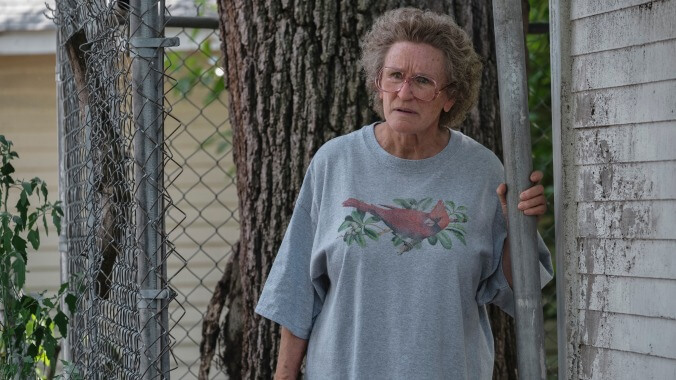
This Ron Howard film based on J.D. Vance’s 2016 memoir of the same name opens with a pastoral, back-to-the-land lament, as a young J.D. (Owen Asztalos) describes how exploring the hills and hollers near his extended family’s hometown of Jackson, Kentucky makes him feel complete. But he, mom Bev (Amy Adams), sister Lindsay (Haley Bennett), and grandmother Mamaw (Glenn Close) can’t stay long. Thanks to a chain of events that began with Mamaw getting pregnant at age 13, they’ve got to travel the “hillbilly highway” back up north to Middletown, Ohio, where they live. From there, the family’s dramatic struggles begin to unfold, cutting between the late ’90s (although you might be forgiven for thinking it was the ’80s) and 2011. That’s when an adult J.D. (Gabriel Basso), now a student at Yale Law School, is forced to come home and take care of some things after Bev overdoses on heroin. He does so while making frequent calls to his girlfriend, Usha (Freida Pinto), back in New Haven, for both narrative and culture-clash purposes. It’s unfortunate that Vance had a difficult time growing up. Addiction is a nightmare for a family, and the powers that be have not done enough to hold those responsible for the opioid crisis in Appalachia to account. But frankly, we’d all be better off if the writer discussed these issues with a therapist rather than spinning them into bootstrapping poverty porn; Hillbilly Elegy just reinforces the stereotypes it insists it’s illuminating. Grade: C- [Katie RifeTwo nominations: Best Supporting Actress, Glenn Close; Makeup and Hairstyling
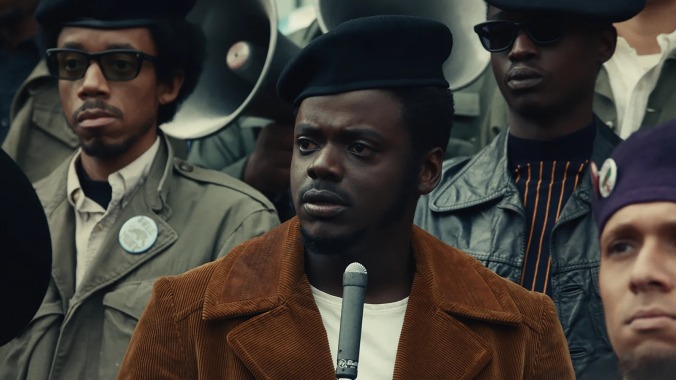
In terms of relating this history, Judas And The Black Messiah is relatively straightforward. It’s framed by the familiar device of a character giving an interview, and anchored by that most quintessential of human experiences: a love story. Director Shaka King takes a novelistic approach to the material, concentrating less on the relationship between the two title characters and more on what was going on in Chicago around the time FBI informant William O’Neal (LaKeith Stanfield) infiltrated the Illinois Black Panther Party in 1968. Those hoping for a climactic confrontation between the film’s exciting lead actors won’t find that here, because, well, it didn’t go down like that in real life. But there’s still plenty of dramatic friction to be found. As Illinois party chairman Fred Hampton, Daniel Kaluuya is the sun around which everything else in Judas And The Black Messiah revolves. Hampton recruits new members, unites warring factions, and, with his charisma and radical platform, scares the bejesus out of FBI director J. Edgar Hoover (Martin Sheen). The activist really comes alive in front of a crowd, as Kaluuya channels the searing intensity he brought to Steve McQueen’s to more righteous but equally electrifying ends. Even off stage, however, the stalwart Hampton rarely lets down his guard, which is what makes his bond with lover and comrade in arms Deborah (Dominique Fishback) so special. She knows how to get through to him the way he gets through to an audience, and Fishback’s knowing softness balances Kaluuya’s steadfast strength to moving effect. Grade: B+ []Six nominations: Best Picture; Supporting Actor, Daniel Kaluuya; Supporting Actor, LaKeith Stanfield; Original Screenplay; Cinematography; SongWhile the film was available on HBO Max for the first 30 days of its theatrical release, it is currently not available to stream. No streaming release date has been announced.
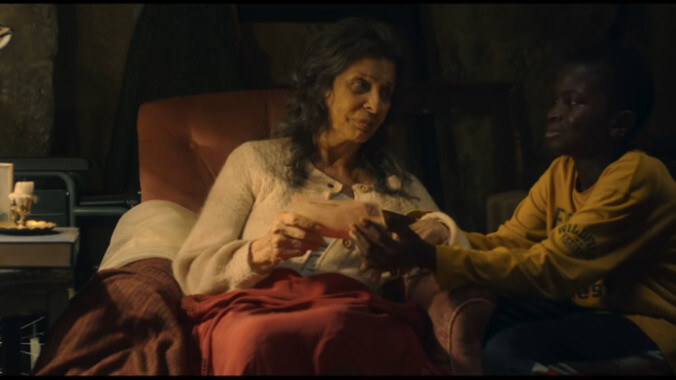
We did not review this film at The A.V. Club, but the Italian drama from director Edoardo Ponti is the third adaptation of the novel The Life Before Us by Romain Gary. It stars Sophia Loren as a former prositute and Holocaust survivor who takes in a 12-year-old street kid. One nomination: Best song
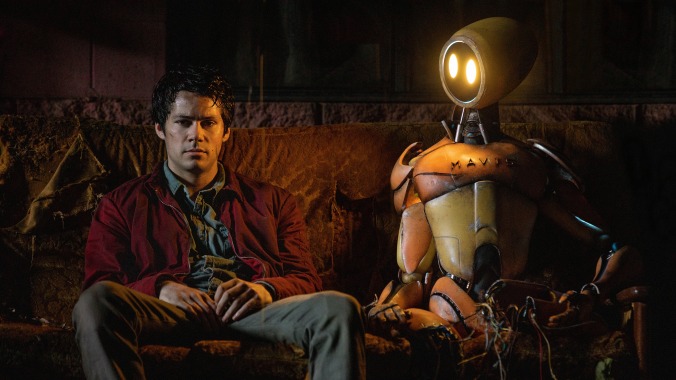
Give Love And Monsters credit: If nothing else, it does at least come up with a new (albeit ludicrous) twist on the killer-asteroid premise that once fueled two disaster in the same year. In this film’s near future—no year specified, but humanoid robots that could pass the are apparently commonplace; every other aspect of life resembles our present day—humanity successfully shoots down the lethal bolide just before it strikes Earth. Unfortunately, the missiles deployed for this rescue mission rain chemicals onto the planet, creating instant Godzilla-style mutations in all cold-blooded animals. About 95% of the global population has been killed by these beasties, we’re informed, with the survivors left to eke out a -ish existence in isolated bunkers. Seven years have since passed, and that’s about as long as Joel Dawson (Dylan O’Brien) can tolerate being separated from former girlfriend Aimee (Jessica Henwick). Aimee’s bunker is a week-long journey by foot, and nobody—much less a comparative wimp like Joel—could likely avoid being eaten for that long. But he sets out anyway, because horny is horny. Grade: C- []One nomination: Bests Visual EffectsAvailable to rent on , , and
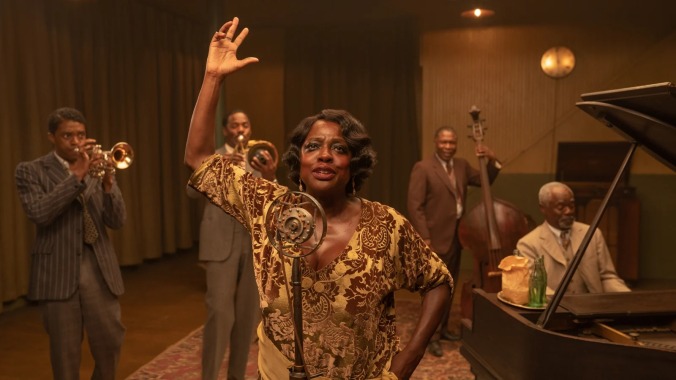
At its core, Wilson’s 1982 play is a tragic allegory about the extremely tenuous nature of the Black American Dream, and how, for too many in this country, prosperity comes down not just to hard work but also righting larger wrongs and overcoming systematic roadblocks. To that end, an ostensibly minor setback can be catastrophic for someone reliant on sweeping success for basic survival—a reality Wilson explores through the figure of Levee, a young, ambitious trumpeter who, over the span of mere hours, loses everything: his job, his love interest, and, via creative theft, much more. Ma Rainey’s is the ballad of a promising talent whose rising star is unceremoniously dimmed. That aspect takes on fresh significance—a uniquely cruel irony—in George C. Wolfe’s new adaptation. After all, Levee is played by Chadwick Boseman, in his final screen role, shot before his . The film has more than its share of toast-worthy elements, from its sharp ensemble to its dutiful nods to 1920s Chicago and Old Hollywood, courtesy of Tobias A. Schliessler’s illuminating cinematography. But the appearance of the actor, in one last tremendous star performance, only enhances the material’s tragic power. Grade: A- []Four nominations: Best Actress, Viola Davis; Actor, Chadwick Boseman; Production Design; Costume Design; Makeup and Hairstyling
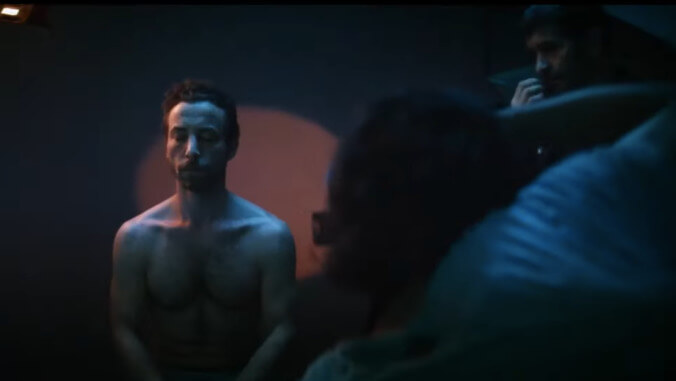
Inspired by Belgian contemporary artist Wim Delvoye’s living work Tim, this internationally co-produced drama from director Kaouther Ben Hania has already won star Yahya Mahayni the Best Actor award at the 2020 Venice Film Festival and is the Tunisian entry for Best International Feature at the Academy Awards. We did not review the film, which tells the story of an engaged couple separated by the Syrian Civil War. In an attempt to gather the funds necessary to reunite with his fiancée, Sam (Mahayni) allows a controversial and celebrated artist to tattoo a Schengen visa on his back and display him as a piece of art—a deal Sam soon realizes was more complicated than he first assumed. [Patrick Gomez]One nominations: Best International FeatureThis film is not currently available to stream. There is no publicized information about when it will be made available.
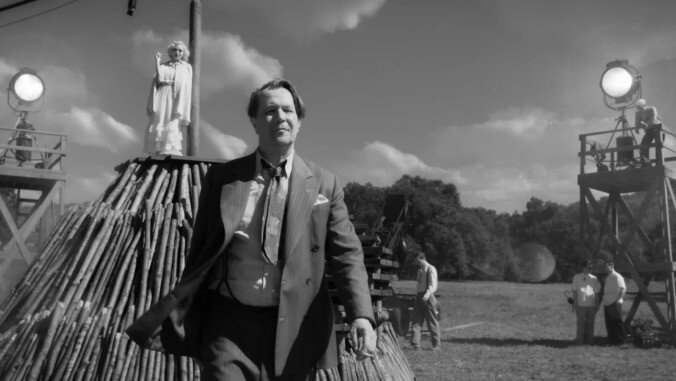
It’s the spring of 1940. The alcoholic screenwriter Herman J. Mankiewicz (Gary Oldman) has come to a secluded ranch outside of Victorville, California to write his masterpiece, a scathing portrait of the newspaper magnate William Randolph Hearst that will eventually be known as Citizen Kane. As Mankiewicz (whom everybody calls “Mank”) lies in bed with a broken leg, he remembers the days when he was the drunken wit of Hearst’s inner circle and a frequent guest at San Simeon, the palatial estate where the tycoon’s movie-star mistress, Marion Davies (Amanda Seyfried), hosted the kind of celebrity and politico parties of which Tinseltown conspiracy theories are born. Like the characters of Kane, he is addicted to retrospection. It’s only later that we come to realize that he is suffering from a condition that is all too familiar: the long-term, post-traumatic effects of election brain. Which is to say that, for a movie that’s nominally about Citizen Kane, one of the greatest artworks on the subject of memory and lost time, Mank is very invested in the forgotten 1934 California gubernatorial election and that critical commodity known as “timeliness.” For David Fincher, the king of the digital control freaks, it’s all part of a tongue-in-cheek experiment in anachronism: the staginess, the gloomy black-and-white cinematography, the archaically compressed mono sound, the cutesy faux cue marks and film scratches that indicate nonexistent reel changes. If such perverse post-modern quirks seem essential to Mank, it’s because they are sometimes the only things keeping this quasi-biopic together. Grade: C+ []10 nominations: Best Picture; Director, David Fincher; Actor, Gary Oldman; Supporting Actress, Amanda Seyfried; Score; Sound; Costume Design; Cinematography; Makeup; Production Design
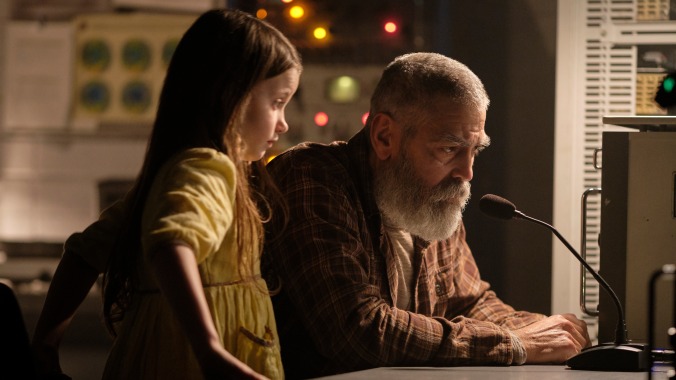
Augustine, the scientist played by George Clooney in his first starring vehicle in four years, is among those who have survived a global apocalypse in the year 2049. The Midnight Sky takes place just three weeks after what it refers to as “the event,” explaining only that it involves massive air contamination and hardly anywhere to hide from it. After an opening scene that teases genuine -style austerity at an Arctic observatory, a flashback shows Augustine opting to stay behind as helicopters full of people set off for safety that is far from guaranteed (and, the movie later suggests, temporary at best). He has some kind of terminal diagnosis seemingly unrelated to the contamination, and decides to bide his time at the base, alone. Clooney the director, however, bails on Arctic desolation pretty quickly, intercutting the story of a spaceship returning from a mission to assess the livability of a recently discovered moon orbiting Jupiter. The crew has no idea that they’ve left what may be the only immediately habitable environment in the solar system. Back on Earth, Augustine encounters a child (Caoilinn Springall) hiding in the base. Curious and persistent, she’s a believable kid character in every way but the precocious silence that movies often lend to children when they want to avoid the messy, unpredictable business of actual preteen emoting. Her stoicism comes in handy when Augustine realizes the ship is heading for Earth and decides to head out through the treacherous Arctic landscape, kid in tow, to another base with a better chance of reaching them. So The Midnight Sky is two survival movies that should fit neatly together as one. The division between the astronauts and the ground team is a familiar structure, here given one clever reversal: The crew aboard the ship is relatively robust, while mission control is one guy with a radio and his mute sidekick. Yet somehow these parallel adventures don’t fall into any real rhythm; the balance keeps shifting uncomfortably. Grade: B- []One nomination: Best Visual Effects
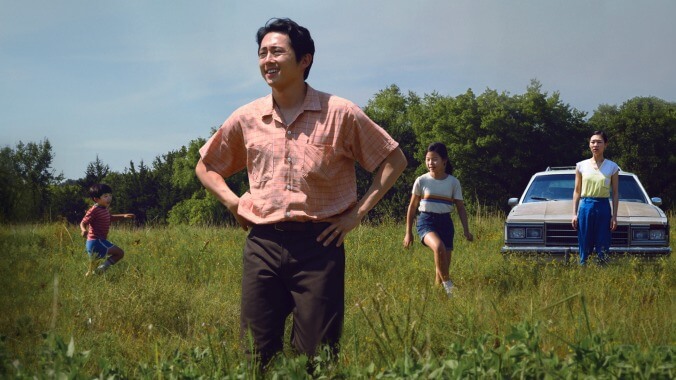
“Daddy’s going to make a big garden,” announces Jacob (Steven Yeun) as his bewildered wife and wide-eyed children take in their unusual new surroundings: lush grassy plains, beautiful but unnervingly secluded. Their home has wheels and they dispose of trash by burning it. Compared to their lives in California, this is a spartan existence, but it’s a sacrifice Jacob is willing to make in his pursuit of the American Dream—a dream that often clashes with the realities of raising a family and maintaining a happy marriage. Loosely based on writer/director Lee Isaac Chung’s childhood living on a farm in rural Arkansas, Minari is that rare slice-of-life drama that contains multitudes without needing to look beyond the borders of its highly specific story. The tale of a Korean-American farming family struggling to work through the growing pains of a new living arrangement that pushes their boundaries of comfort and familiarity, Chung’s tender and deeply considered debut avoids the treacly, redemptive formulas of immigrant dramas that center the resilience of its characters against the scourge of racism. Rather, Chung’s intimate if occasionally lopsided portrait of the immigrant experience peels back the layers of a family unit under threat of collapse. Grade: B []Six nominations: Best Picture; Director, Lee Isaac Chung; Actor, Steven Yeun; Supporting Actress, Yuh-jung Youn; Original Screenplay; ScoreAvailable for rent on , , ,
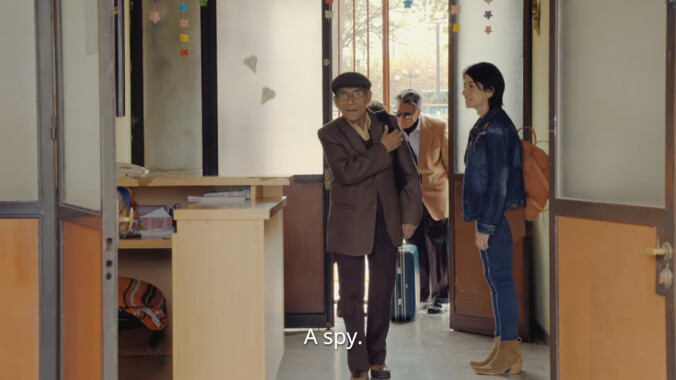
We did not review this film, which was Chile’s submission for Best International Feature. The documentary tells the story of a private investigator hires an elderly man to go undercover in a nursing home in Chile. The film debuted at Sundance 2020 and debuted on PBS in January 2021.Nominations: Best International Feature and to rent on other VOD platforms
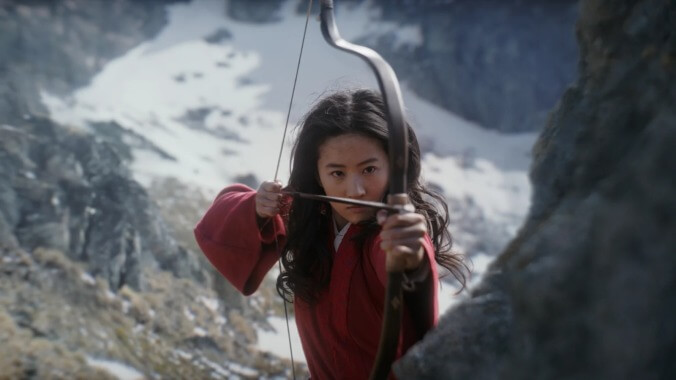
At the helm of this Disney live-action remake of the ’90s animated film is the underrated Kiwi director Niki Caro, one of the few women afforded a production budget larger than $100 million. It’s not a beat-for-beat re-creation or a joyless rehash of the animated original like last year’s or ; aspiring instead to a slightly more serious action-adventure saga, it throws out the talking dragons and catchy musical numbers. Yet this Mulan makes its adjustments while still aiming to be as widely palatable as possible, and in the process, ends up short on both character development and emotional heft. Rather than lean into the more mature elements that make it stand out, the movie does frustratingly little with its noteworthy upgrades on the , resulting in a version of the story that’s only superficially more sophisticated. Grade: C+ []Two nominations: Best Costume Design; Visual Effects and to rent on other streaming platforms
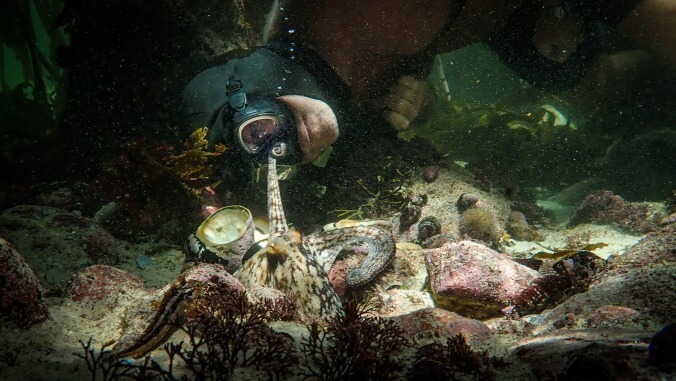
Netflix’s My Octopus Teacher, directed by Pippa Ehrlich and James Reed, centers on Craig Foster, a filmmaker who forges a bond with an octopus in the wild. We did not review the documentary, but we did cover . [Patrick Gomez]One nomination: Best Documentary
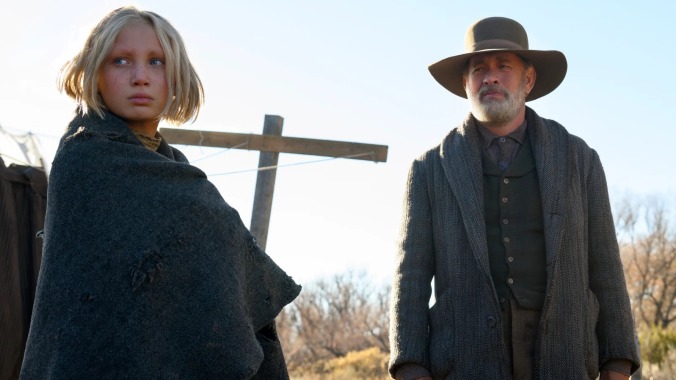
It’s 1870, near Wichita Falls, Texas. Captain Jefferson Kyle Kidd (Tom Hanks) stumbles upon a wagon in the road, overturned and abandoned. Cowering within is Johanna Leonberger (Helena Zengel)—or that’s what she was called six years earlier, a lifetime ago for a child, when she was taken by the Kiowa tribe that raided her parents’ settlement. Now 10, this blond urchin goes by Cicada and speaks only the language of the now-dead people who kidnapped and then raised her. “Orphaned twice over,” the lone survivor of two massacres, she has biological relatives—an aunt and uncle she’s never met—but they live 400 miles south, in a community of German immigrants. It’s Kidd who agrees to escort the girl on this long, dangerous voyage. “Captain, why are you doing this?” someone asks him at the onset of the expedition. The short answer is that it’s the right thing to do, and he’s a Tom Hanks character—which is to typically say, a paradigm of integrity. Kidd has an unusual profession: He goes town to town, reading newspapers aloud to an assembly of interested citizens, like a proto, itinerant Tom Brokaw. Five years out from the war that pitted brother against brother, Kidd carries the weight of a fractured nation on his shoulders. Though he fought for the Confederacy, he seems to harbor no prejudices or resentments. Early into the film, he’s reciting President Grant’s conditions for the Southern states to reenter the Union, and as the crowd becomes unruly—“don’t shoot the messenger” would be an all too literal request in this case—Kidd delivers an impassioned but plainspoken case for peace and unity. Hanks may be the only actor who could sell such a speech in 2020. He makes it sound sensible and right, not like certain hollow contemporary pleas to try and “understand the other side.” Can America’s dad find a common ground between the “two Americas,” all while restoring respect for a free press? There’s no missing the parallels News Of The World hopes to draw between the divided country it depicts and the one it’s being released into. Grade: B- []Four nominations: Best Cinematography; Score; Sound; Production DesignAvailable to rent on , , , and
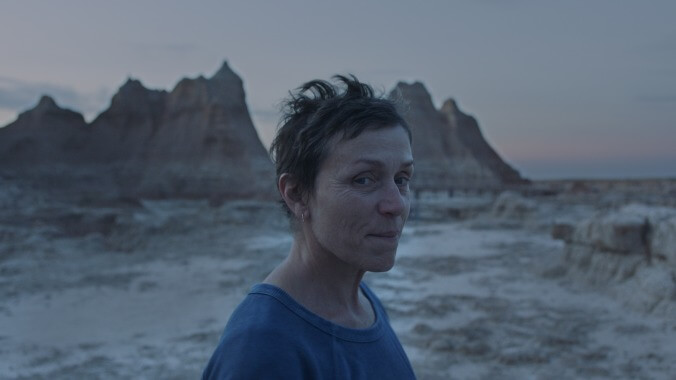
Unless the political landscape changes significantly over the next few years, the number of Americans facing an old age like the one profiled in Nomadland will only continue to grow. A longtime resident of Empire, Nevada, Fern (Frances McDormand) watched her town shrivel up and die after the gypsum mine that employed the majority of the community shut down in January 2011. A dandelion seed left to float on the fickle winds of capitalism, Fern now lives in a custom van she calls “Vanguard,” traveling in search of temporary employment and a safe place to park overnight. In the winter, she packs boxes at an Amazon warehouse; in the summer, she fries burgers and cleans toilets at tourist attractions. Her pleasures are simple, her struggles immense. Her hair is short, her shoes sensible. She keeps moving so she doesn’t dwell on the past for long. In different hands, Fern’s story might be tragic. But while Nomadland director (and writer and editor and co-producer) Chloé Zhao is interested in the material realities of a sixtysomething widow living an itinerant lifestyle, she also brings a dignity to the film that verges on sublime. Grade: A- []Six nominations: Best Picture; Actress, Frances McDormand; Director, Chloé Zhao; Cinematography; Adapted Screenplay; Editing
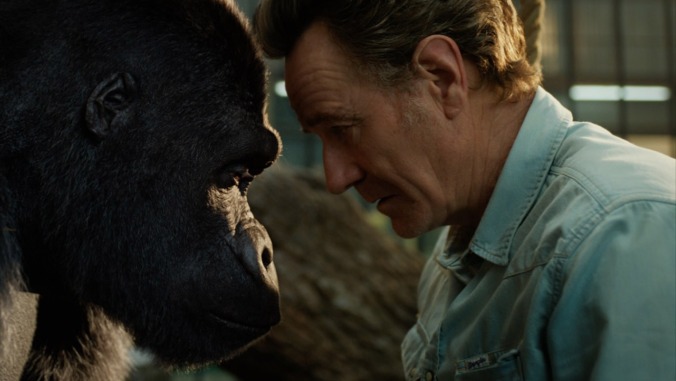
We did not review this film, but when was released to bookstores in 2013, it found scores of young adult fans and won the prestigious Newbury Medal for being, as the awards committee says, “the most distinguished contribution to American literature for children.” The novel has been adapted for Disney+ by writer Mike White and stars Brian Cranston as Mack, the owner of the Big Top Mall, and de factor ringleader to the titular ape Ivan and his critter pals who don’t realize there’s a whole world waiting for them outside captivity. [Cameron Scheetz and Marah Eakin]One nomination: Best Visual Effects
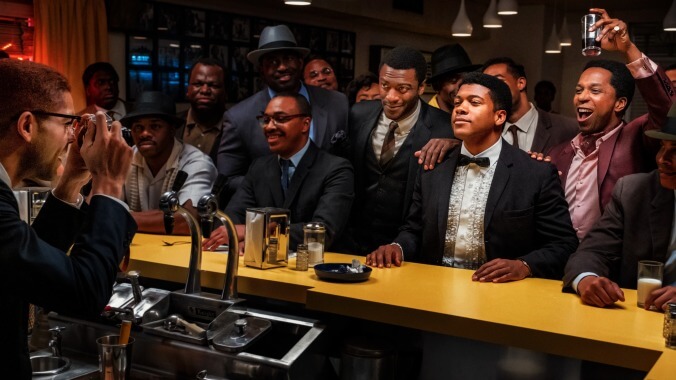
After winning the heavyweight championship against Sonny Liston, a 22-year-old Cassius Clay headed to civil rights luminary and spiritual mentor Malcolm X’s suite at the historical Hampton House in Miami. There, the gentlemen were eventually joined by soul icon Sam Cooke and celebrated Cleveland Browns fullback Jim Brown. The night has long been immortalized as an apex of four seemingly converging moments in Black American history: Soon after, Clay would reintroduce himself as Cassius X—then later as Muhammad Ali—and publicly solidify his devotion to Islam. Already a champion of civil rights, Brown—the lone survivor of the quartet—would retire from football at the height of his athletic career to pursue acting. Less than a year after their meet-up, the world would tragically lose both Cooke and Malcolm X. Very little is known about the miraculous summit that took place in that modest hotel room on February 25, 1964, leaving the moment ripe for artistic speculation. Playwright Kemp Powers took blessed advantage of this in his debut play, One Night In Miami…, a 90-minute fictional account that places unwavering focus on the meeting by sequestering its action within the walls of the hotel suite. In her feature directorial debut, Regina King gently widens the scope of Powers’ story, while zeroing in on the beauty of this serendipitous union. With the help of four intuitive performances, King’s film adaptation briefly removes these titans from their pedestals to tell a meaningful story that is as humane as it is political—a difficult feat when you’re talking about some of the biggest cultural figures in modern history. Grade: B []Three nominations: Best Supporting Actor, Leslie Odom Jr.; Adapted Screenplay; Song;
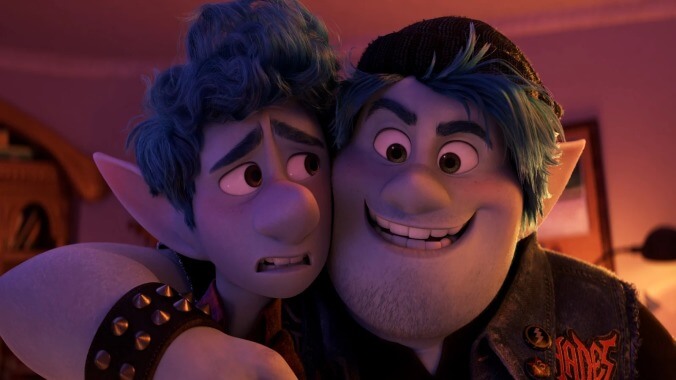
Just about every Pixar movie transports audiences to a shiny new world of wonder: the depths of the ocean, the deepest reaches of space, the inside of the human brain. But the key to the studio’s enduring popularity may be the way it tethers those meticulously crafted backdrops to stories of relatable emotion and experience, even when the characters are, say, hunks of sentient plastic or nightmarishly organic automobiles. Onward, Pixar’s latest blast of spit-shined enchantment, comes close to making that core principle literal. It takes place, after all, in a literal fantasy world, full of the kind of mythic creatures you might see gallivanting through a Tolkien or Rowling adaptation. The movie’s premise, and its central joke, is that this fairy-tale kingdom has become, centuries on and with the advent of technology, as mundane as our real world: Centaurs now chug around town in cars instead of running free, cyclopes swipe at smart phones, and unicorns—that most cherished of imaginary critter—are so common they’re basically trash-eating pests, like raccoons with horns. It’s a fun idea, albeit one that accidentally recalls the basic setup of Netflix’s overblown . But watching Onward, it’s hard to shake the feeling that maybe Pixar has overplayed the mundane half of its winning equation. They’ve made a movie about looking for misplaced magic in the modern world that, well, kind of misplaces the magic. Grade: B- []One nomination: Best Animated Feature and to rent on other VOD platforms

Over The Moon, a gorgeous animated film from Glen Keane, is inspired by Chang’e, the Chinese moon goddess. In this retelling of the fables, a young girl named Fei Fei (voiced by Cathy Ang), who grew up hearing stories of Chang’e from her mother, builds a rocket ship to travel to the moon and meet the goddess. We didn’t review the mobie but we can assure that neon-splashed tableaux and wacky, space animal-related hijinks ensue. []One nomination: Best Animated Feature
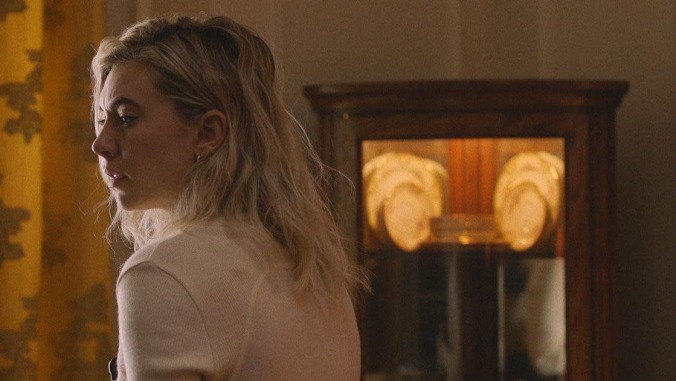
Pieces Of A Woman, Hungarian director Kornél Mundruczó’s first English-language feature, opens with a bang, then immediately sputters. In its harrowing prologue, which depicts a home birth gone terribly wrong in one mesmerizing continuous take, we see a young couple, Martha (Vanessa Kirby) and Sean (Shia Labeouf), plunged into the sudden chaos of delivery. After nearly 23 minutes on edge, Martha holds her newborn baby in her arms for a few blinks of an eye before tragedy strikes and the opening title card hits the screen. The director’s latest is meant to be a portrait of grief in the aftermath of a staggering loss. The pain of mourning someone that never truly had a chance to live is complex, slippery, unimaginable. So unimaginable, in fact, that Mundruczó and screenwriter Kata Wéber seem to have difficulty imagining it themselves. The result is a clichéd maelstrom of psychological turmoil and empty outpourings of feeling. The film is uninterested in the inner world it claims to investigate; it also cheapens a woman’s trauma by rendering her pain into a confused dramatic spectacle. Grade: C- []One nomination: Best Actress, Vanessa Kirby
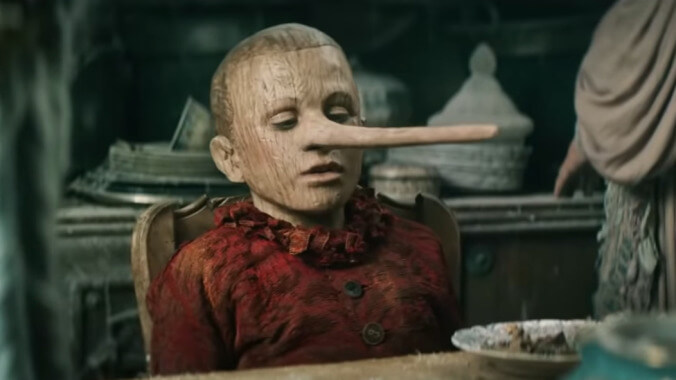
Eighteen years after he played the puppet with aspirations to real boyhood, Oscar-winning seat-climber Roberto Benigni has aged into the role of the elderly woodcarver Geppetto. Directed by Matteo Garrone, who dabbled in fairy-tale magic of a much more adult nature in , this new adaptation of the classic story premiered to mostly positive reviews at the Berlin International Film Festival back in February 2020.We didn’t review the film ourselves, but, at the very least, it has to be better than Benigni’s —or, for that matter, .Two nominations: Best Costume Design; Makeup and HairstylingAvailable to rent on , , , and

Promising Young Woman has the bright, alluring sheen of a pop confection. The paint-swatch spectrums of pink and blue—powder to electric neon, baby to deep navy—that dominate its color palette are both soothing to the eyes and in step with Instagram trends. Its soundtrack, packed with 21st-century bubblegum pop, imparts a similar sweetness. The title character wears fuzzy floral sweaters and sucks on red licorice, and every shade of girly, from kawaii to rococo, splashes across the screen at some point. Then there’s the cast, which is full of reassuringly familiar faces, from Adam Brody and Christopher Mintz-Plasse to Laverne Cox and Alison Brie. But the hard-candy shell that coats the film conceals a razor blade, ready to cleave the tongues of those entitled enough to chomp down without letting it melt in their mouths first.Five nominations: Best Picture; Actress, Carey Mulligan; Director, Emerald Fennell; Original Screenplay; EditingAvailable to rent on , , , and
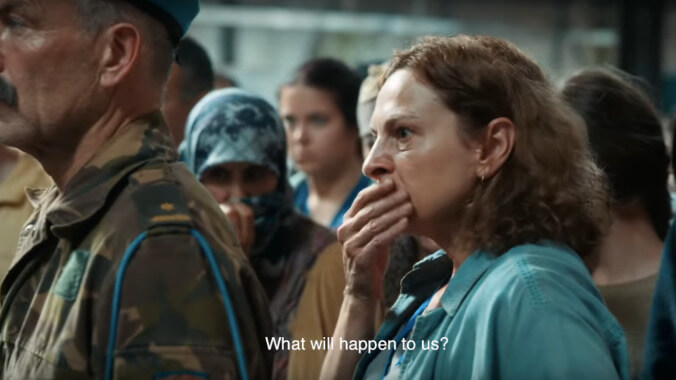
We did not review this 2020 Bosnian war drama film from Jasmila Žbanić, which was in competition at the 2020 Venice Film Festival. Set in 1995, the drama centers on a UN translator in a race to save her family after the Army of Republika Srpska takes over the city of Srebrenica prior to the Srebrenica massacre. [Patrick Gomez]One nomination: Best International FeatureAvailable to rent on and

Farmageddon has received overwhelmingly warm reviews at home. It’s mild, inoffensive, and (aside from the songs) never irritating. Yet it seems undeniable that the film is a cut below even such decidedly minor Aardman productions as . The studio’s best work is infinitely rewatchable, offering up imaginative worlds of stop-motion logic, filled with characters who combine the outlines of drawn cartoons with the texture of hobby materials. But all that Farmageddon delivers is a not-unpleasant distraction for a cold, lazy afternoon. Grade: C+ []One nomination: Best Animated Feature

Long stretches of the Pixar movie, Soul, are set in a serene nirvana called The Great Before. With its soft, glowing edges and inviting blue-purple pastels, the place is basically a meditation app brought to holographic life—a vibe it gets partially from its score, an uncharacteristically soothing soundtrack from Trent Reznor and Atticus Ross. The scenes not set in the cuddly netherworld take place instead in a bustling New York, populated by characters with expressive features and slightly exaggerated physiques. It’s here that Joe Gardener, a jazz pianist voiced by Jamie Foxx, steps into a manhole, ending his life just as he felt it was really beginning. Soul is pioneering in one respect: It’s the first Pixar movie to center on a Black character, though he spends more than half of the brisk 100 minutes outside of his body. (As with Coco, the predominately white creative team has looked to outside hires to bolster the cultural authenticity, bringing aboard screenwriter Kemp Powers to co- write/direct.) In other respects, however, the film feels a little secondhand, a little Pixar redux. At this point, we’re supposed to be grateful for any break in the assembly line of sequels that now dominate a bit too much of this celebrated animation house’s resources. Yet in its lite existential musing, its gentle humor, its occasional bursts of genuine visual invention, Soul comes across like an appealing hodgepodge of past glories—the , lassoed to the conceptual ambition of director Pete Docter’s previous project, . Grade: B []Three nominations: Best Animated Feature; Score; Sound
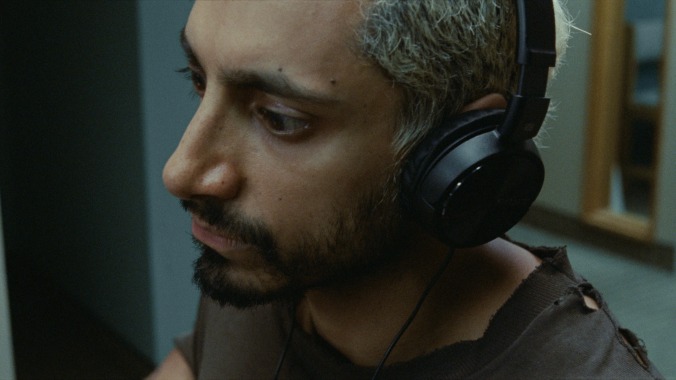
Sound Of Metal is nothing without its sound design. It’s a story about music and deafness—both auditory phenomena—and its success depends on being able to put you into the main character’s beat-up Converse. The film does accomplish that, thanks in part to its unique, first-person approach to sound at it explores a the life of a drummer, Ruben (Riz Ahmed), as he loses his hearing. Sometimes it sounds like we’re underwater; other times there’s a shrill, high-pitched hum around the perimeter of the dialogue. Combined with Ahmed’s nuanced, naturalistic lead performance, the result is a palpably empathetic experience. But the film’s commitment to realism isn’t always an asset. What keeps Sound Of Metal from wandering off into the wilderness is Ahmed’s performance, which remains compelling even when the script loses its narrative footing. When Reuben first arrives at a secluded deaf community as he copes with his changing body, he’s a vessel overflowing with frustration and sorrow, his eyes welling up with tears when he finally admits, “Today is not a good day.” Over the following weeks (or months? It’s difficult to say) the change in the character is reflected not only in Ahmed’s eyes but also in his posture, which changes from clenched to relaxed and open. He’s a seeker on a pilgrimage for inner peace, and it’s not clear if he ever quite finds it. But the important thing, as he learns from a series of gurus throughout Sound Of Metal, is to keep putting one foot in front of the other—or one stick in each hand, as the case may be. Grade: B []Six nominations: Best Picture; Actor, Riz Ahmed; Supporting Actor, Paul Raci; Original Screenplay; Sound; Editing
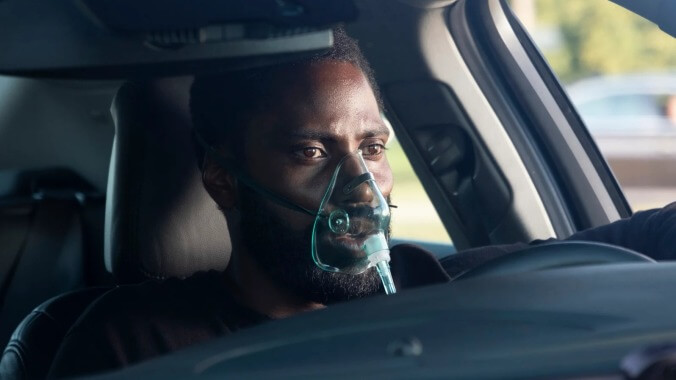
Perhaps it was inevitable that Nolan would one day tackle the brain-bending anti-logic of time travel. Most of his films play with chronology in one way or another: shuffling it, running it backwards, expanding and contracting it like an accordion. In Tenet, the manipulation of time is baked right into the labyrinthine story, which hinges on the concept of “inversion”—the ability, as the film hastily half-clarifies, to reverse the temporal movement of objects, essentially rewinding their path through space and time. Early into the movie, a well-dressed man steps up to a shooting gallery and, to his surprisingly mild surprise, “catches” the bullet embedded on the other end, casually flipping the relationship between cause and effect. “Don’t try to understand it,” a scientist tells him. “Just feel it.” Sage advice, perhaps, for the viewer, though also a tad ironic coming from a film whose whole point is the intricacy of its architecture. Grade: C+ []Two nominations: Best Production Design; Visual EffectsAvailable to rent on , , , , and
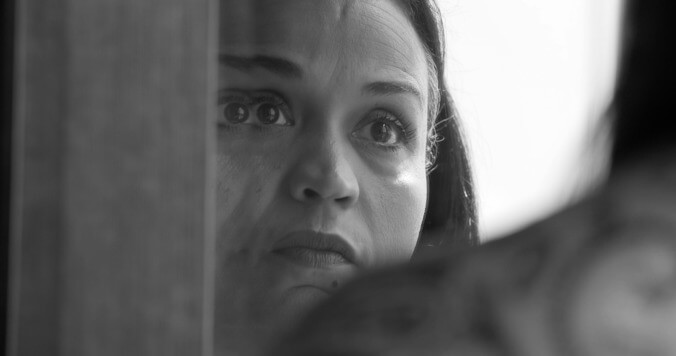
Garrett Bradley’s Time features several scenes of a woman on hold, patiently waiting on the line for what will probably be bad news. She is Sibil “Fox” Rich, small business owner and self-proclaimed abolitionist, and for almost two decades, she’s been tirelessly lobbying for the release of her husband, Rob, who’s serving an abnormally long sentence at Angola, a.k.a. the Louisiana State Penitentiary. Fox’s crusade requires a lot of calls to the courthouse, and more than once, we’re plopped down next to her in her office, as she presses a phone against one ear and politely inquires about a decision she’s usually told—after a few minutes of dead air—the judge hasn’t made yet. Bradley isn’t there with her camera every time Fox makes the call—a task, we’re led to understand, that’s sometimes performed daily. But when she is there, the director makes sure to match her subject’s patience and just stay planted, letting the audience feel every pregnant second that elapses during this regular, dispiriting appointment with the cogs of legal bureaucracy. This is what the appeals process often looks like: waiting to learn that you’ll have to wait longer. Grade: B+ []One nomination: Best Documentary
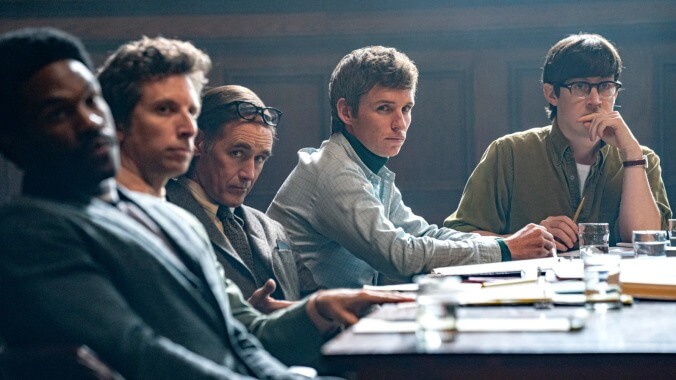
Though set on the chaotic precipice of the late 1960s, The Trial Of The Chicago 7 offers a disturbingly familiar vision of an America where police come down hard on peaceful demonstrators, where the federal government conducts witch hunts for the “radical left,” and where Black citizens are murdered with impunity. Of course, all of that’s been true and “timely” for the half-century that separates the film’s real-life events from those of current headlines. And with Sorkin at the helm, it takes the evergreen shape of crowd-pleasing political theatre, the kind on which the West Wing creator has built a career. Here he’s dramatized a true story of legal railroading: the proceedings that followed 1968’s Democratic National Convention, when thousands of protesters flooded Chicago and were greeted with the very kind of blunt-force police brutality that’s currently filling up social media feeds and cable-news programs. Months after the teargas cleared, the justice department of the newly elected President Nixon pressed charges of conspiracy and inciting riots against several prominent anti-war activists. Parallels to the present aside, Trial Of The Chicago 7 is ultimately more timeless than timely in its flaws and conventions. Which is to say that some things sadly never go out of fashion, like perversions of justice and eleventh hour surprise witnesses in legal dramas. Grade: C+ []Six nominations: Best Picture; Supporting Actor, Sacha Baron Cohen; Screenplay; Editing; Cinematography; Song

Lee Daniels obviously isn’t a realist. Since his breakthrough, , he has developed a reputation as a director who throws in everything but the kitchen sink. But one can’t help but think that The United States Vs. Billie Holiday—Daniels’ take on the tragic destruction of Holiday (Andra Day) and her simultaneous struggles with the feds, heroin addiction, and her messy personal life—could do with some more melodrama. The material is ambitious and irresistible: Holiday’s arrest, conviction, and incarceration for drug possession, which came at the height of her popularity; her self-destructive streak; the furor over “Strange Fruit”; her romance with Tallulah Bankhead (Natasha Lyonne) and peculiar relationship with Jimmy Fletcher (Trevante Rhodes), the Federal Bureau Of Narcotics agent who was initially sent to infiltrate her inner circle. But the script is more timeline than drama. Day, who’s very good, moves through it with comfort and charisma. Her Billie Holiday is as much a star in the green room as she is onstage, faced with applause or the harsh bathroom-mirror reflection of abuse and addiction. But many of the other characters might as well be reading off of cue cards. Grade: C []One nomination: Best Actress, Andra Day
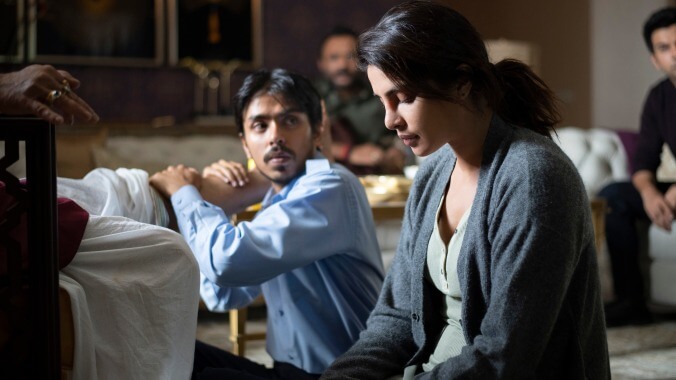
Born into a low caste, Balram (Adarsh Gourav) has an aptitude for schooling that’s quickly shunted aside when he needs to contribute an extra pittance for his family and is sent to work as a child. He sees a possibility for escape through servitude; his grandmother agrees to let him leave their small village and pursue driving lessons, so that he can get a job playing chauffeur for a rich family and send most of his money home. That’s exactly what he does, and eventually finagles a plum spot with the more Americanized members of a wealthy clan: Ashok (Rajkummar Rao) and his largely U.S.-raised wife, Pinky (Priyanka Chopra Jonas). Balram travels with them to Delhi, where the couple stays in a posh hotel and he joins the parallel community of drivers and servants who dwell in the parking garage below. The dynamic between Balram and his employers is sharply observed. The couple considers themselves more modern and enlightened than the rest of their family, insisting that Balram not call Ashok his “master,” and occasionally treating him something like a friend. At the same time, they take turns “encouraging” him with maximum condescension and sometimes outright berating him when they deem it necessary. Their supposed kindness is a convenience, and not to Balram. It’s all exacerbated by a mid-movie turn with overtones of The Great Gatsby, minus a mysterious figure of intoxicating charisma. Balram doesn’t need a Gatsby type to seduce him into a world of wealth; he gets starry-eyed at the sight of any meager opportunities that exist above the poverty line. To convey the lack of glamour, India isn’t shot with the usual western visual clichés; the skies frequently look overcast, and there’s barely a vivid orange-and-brown color scheme to be found. Delhi isn’t exoticized into a tourist brochure. Grade: []One nomination: Best Adapted Screenplay

Wolfwalkers, an animated movie from the makers of the Oscar-nominated , is a vibrant and expressive fantasy, magical and unyoked to realism without pulling any punches about the destructive folly of manifest destiny. It’s singular, even as it nestles nicely with a philosophical big sister, Studio Ghibli’s . And its tumultuous heart beats with the deep-seated unease coloring everything around us right now. Mourning the death of her mother, the young Robyn Goodfellowe (voiced by Honor Kneafsey) has traveled from England to Kilkenny, Ireland with her hunter father, Bill (Sean Bean, steadfast but harrowed), and bird friend Merlyn. Here, she bristles against the restrictions put upon the people by the nefarious Lord Protector (Simon McBurney). As in The Secret Of Kells and Song Of The Sea, co-director Tomm Moore’s previous movies with Cartoon Saloon, the artwork and design philosophy of every aspect of the film are breathtaking, utilizing traditional hand-drawn 2D animation to tap into the subconscious. This is a textured and vibrant world, all woodcuts and watercolors. Grade: B+ []One nomination: Best Animated Feature
GET A.V.CLUB RIGHT IN YOUR INBOX
Pop culture obsessives writing for the pop culture obsessed.